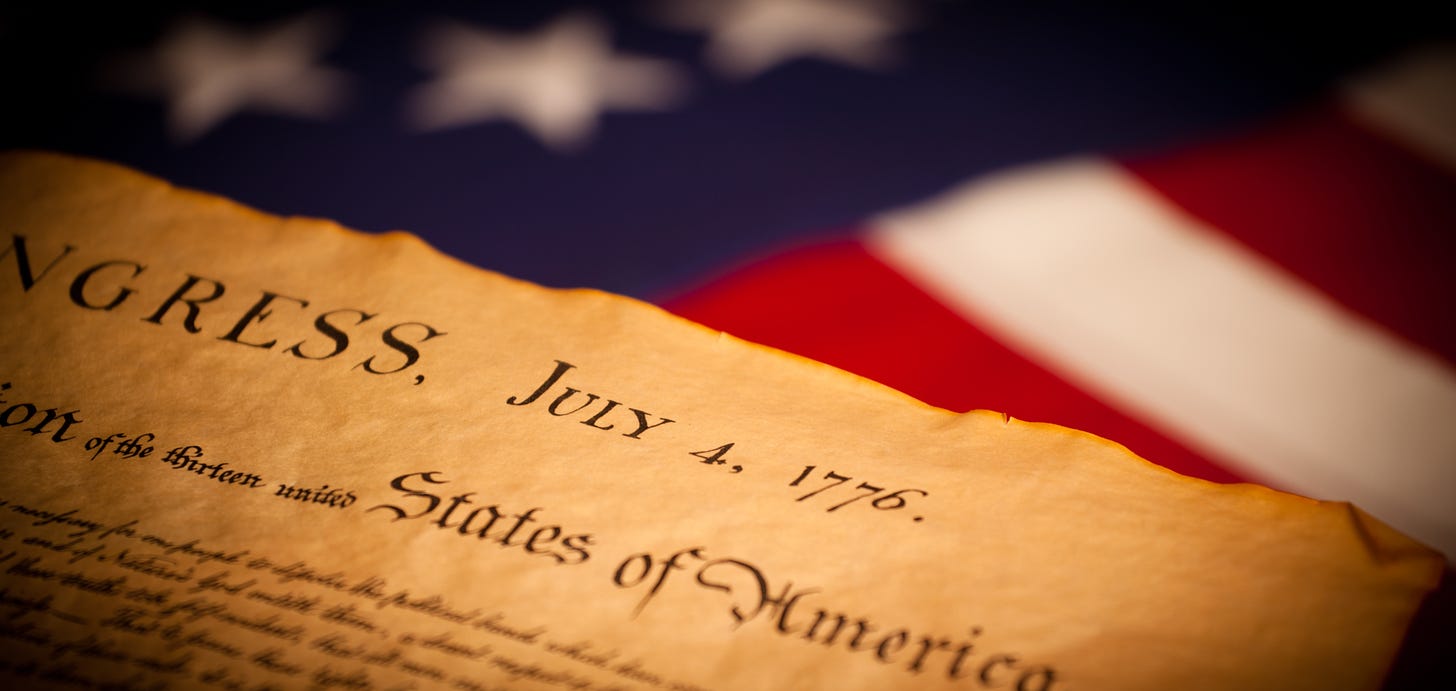The Greater Preamble
While it's not binding law, the Declaration is nevertheless indispensable & necessary for comprehending the spirit of the laws that bind our union to truths that transcend faction & division.
It isn’t uncommon for school children to memorize the relatively brief and to the point opening refrain of the US Constitution, the passage we call the Preamble:
“We the People of the United States, in Order to form a more perfect Union, establish Justice, insure domestic Tranquility, provide for the common defence, promote the general Welfare, and secure the Blessings of Liberty to ourselves and our Posterity, do ordain and establish this Constitution for the United States of America.”
This single sentence represents the extent of prose in the US Constitution, the rest of the document being purely legal text designed to constitute a government, establish its processes, and define the limits of its exercise. Because of this, many call the US Constitution “soulless.” Its language, more often than not the result of serious compromise, was often left vague so that disparate delegates with different beliefs on the roles of government could be content with the finished document. Specifically, many point out the absence of any reference to deity or even a nod to the divine, leading some to criticize (or celebrate) the document as “Godless.”
But it’s important to understand that the framers, for all their differences, were working from a general agreement about certain “self-evident” truths. As Alexander Hamilton wrote in The Farmer Refuted, “The sacred rights of mankind are not to be rummaged for among old parchments or musty records. They are written, as with a sunbeam, in the whole volume of human nature, by the hand of the divinity itself, and can never be erased or obscured by mortal power.”
The foundation of the US Constitution lies in the words and actions said and done in the prelude to its framing. Indeed, the framers had as their task to constitute a government. And that they did, feeling no need to add further discourse upon the legacy that had been wrought by the pen and by the sword that had already cracked the cornerstone of humanity’s long march through tyranny and oppression.
It is in this framework of greater context and the spirit of the founding that I often refer to the Declaration of Independence as “the greater preamble.” The framing of the Constitution was the creation of a government that secures “the Blessings of Liberty” fought for and bled for in the revolution and secured the vision of government laid out in the Declaration of Independence.
It’s fitfully symbolic, then, that the parades, the fireworks, the barbeques, and the marvelous celebration we engage in to mark the birth of our nation are on July 4th, the date marking the adoption of the Declaration of Independence, not September 17th (when the Constitution was signed) or June 21st (when the Constitution was ratified).
Yes, we celebrate the Constitution, we honor the framers, and we thank God for the form of government it established. But we don’t celebrate the “Spirit of 1787.” We don’t mark the birth of our nation by the formation and institution of its lasting form of government.
We celebrate the “Spirit of 1776” because this nation wasn’t merely established by the legalistic words that organized us into a polity; it was established by those who faced down the wrath of a king, who declared “we mutually pledge to each other our Lives, our Fortunes and our sacred Honor” as they responded to “the long train of abuses and usurpations, pursuing invariably...a design to reduce them under absolute Despotism.”
It was their expressed intent to “institute new Government, laying its foundation” on the “self-evident” truths that “all men are created equal” and “that they are endowed by their Creator with certain unalienable Rights.” Their whole vision was “to provide new Guards for their future security” in order to “secure these rights” that “the Laws of Nature and of Nature's God entitle them.”
The US Constitution is indeed the capstone of the founding vision, but the Declaration of Independence is the cornerstone. Not only can one not be understood without the context of the other, the one becomes a feckless parchment barrier without true enforcement or endurance in a nation whose people do not remain converted to the spirit and designs of the other.
On this Fourth of July, let us remember that our freedom is not preserved by crouching behind aged paper but by attesting to the ageless wisdom of self-evident truths upon which our constitution was built. Let us read the Declaration of Independence, that greater preamble, searching for a better grasp of what our ancestors believed in and fought for, and gain renewed purpose in living for its precepts and passing the torch of liberty to our fellow citizens and future generations.



